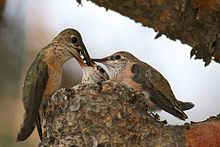- Parental investment
-
For theory that females invest more energy into producing child, see Bateman's principle. For cost of raising a human child, see Cost of raising a child.
 A female Calliope Hummingbird feeding her chicks
A female Calliope Hummingbird feeding her chicks
In evolutionary biology, parental investment (PI) is any parental expenditure (time, energy etc.) that benefits one offspring at a cost to parents' ability to invest in other components of fitness (Clutton-Brock 1991: 9; Trivers 1972). Components of fitness (Beatty 1992) include the wellbeing of existing offspring, parents' future reproduction, and inclusive fitness through aid to kin (Hamilton, 1964). Parental investment is sometimes incorrectly equated with parental care or parental effort. What is the difference?
Parental investment theory is a branch of life history theory. The earliest consideration of parental investment is given by Fisher (1930), Fisher's principle, wherein Fisher argued that parental expenditure on both sexes of offspring should be equal. Clutton-Brock (1991: 9) expanded the concept of PI to include costs to any other component of parental fitness.
Robert Trivers' theory of parental investment predicts that the sex making the largest investment in lactation, nurturing, and protecting offspring will be more discriminating in mating; and that the sex that invests less in offspring will compete for access to the higher-investing sex (see Bateman's principle[1]). Sex differences in parental effort are important in determining the strength of sexual selection.
Reproduction is costly. Individuals are limited in the degree to which they can devote time and resources to producing and raising their young, and such expenditure may also be detrimental to their future condition, survival, and further reproductive output.
However, such expenditure is typically beneficial to the offspring, enhancing their condition, survival, and reproductive success. These differences may lead to parent-offspring conflict. Parental investment can be provided by the female (female uniparental care), the male (male uniparental care), or both (biparental care). Parents are naturally selected to maximise the difference between the benefits and the costs, and parental care will tend to exist when the benefits are substantially greater than the costs.
Parental care is found in a broad range of taxonomic groups, including both ectothermic (invertebrates, fish, amphibians and reptiles), and endothermic (birds and mammals) species. Care can be provided at any stage of the offspring's life: pre-natal care including behaviours such as egg guarding, preparation of nest, brood carrying, incubation, and placental nourishment in mammals; and post-natal care including food provisioning and protection of offspring.
In iteroparous species, where individuals may go through several reproductive bouts during their lifetime, a tradeoff may exist between investment in current offspring and future reproduction. Parents need to balance their offspring's demands against their own self-maintenance. This potential negative effect of parental care was explicitly formalised by Trivers (1972), who originally defined the term parental investment to mean any investment by the parent in an individual offspring that increases the offspring's chance of surviving (and hence reproductive success) at the cost of the parent's ability to invest in other offspring.
The benefits of parental investment to the offspring are large and are associated with the effects on condition, growth, survival, and ultimately on reproductive success of the offspring. However, these benefits can come at the cost of parent's ability to reproduce in the future e.g., through increased risk of injury when defending offspring against predators, loss of mating opportunities whilst rearing offspring, and an increase in the time interval until the next reproduction.
Overall, parents are selected to maximise the difference between the benefits and the costs, and parental care will be likely to evolve when the benefits exceed the costs.
See also
References
- ^ Bateman, A. J. (1948). "Intra-sexual selection in Drosophila". Heredity 2 (Pt. 3): 349–821. doi:10.1038/hdy.1948.21. PMID 18103134.
- Beatty, John. 1992. "Fitness: theoretical contexts," in Key Words in Evolutionary Biology. Edited by EF Keller and EA Lloyd, pp. 115–9. Cambridge, MA: Havard U.Press.
- Clutton-Brock, T.H. 1991. The Evolution of Parental Care. Princeton, NJ: Princeton U. Press.
- Clutton-Brock, T.H. and C. Godfray. 1991. "Parental investment," in Behavioural Ecology: An Evolutionary Approach. Edited by J.R. Krebs and N.B. Davies, pp. 234–262. Boston: Blackwell.
- Hamilton, W.D. 1964. The genetical evolution of social behavior. Journal of Theoretical Biology 7:1-52.
- Trivers, R.L. (1972). Parental investment and sexual selection. In B. Campbell (Ed.), Sexual selection and the descent of man, 1871-1971 (pp. 136–179). Chicago, IL: Aldine. ISBN 0-435-62157-2
Further reading
- Geary, D. C. (2005). Evolution of paternal investment. In D. M. Buss (Ed.), The handbook of evolutionary psychology (pp. 483–505). Hoboken, NJ: John Wiley & Sons. Full text
Evolutionary psychology Processes Areas Psychological development · Morality · Religion · Depression · Developmental psychopathology · Educational psychology · MusicSeminal writers Related subjects Lists Categories:
Wikimedia Foundation. 2010.
